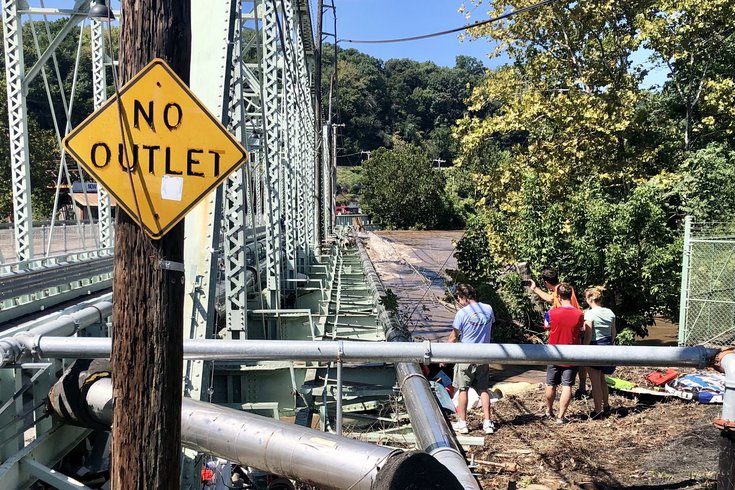
August 02, 2023
 Jon Tuleya/For PhillyVoice
Jon Tuleya/For PhillyVoice
Peak hurricane season is fast approaching, and FEMA has tips for keeping residents and businesses safe and prepared for severe weather events. Above is a file photo of damage from Hurricane Ida in 2021.
Peak hurricane season is coming. Though hurricane season in the Mid-Atlantic region typically runs from June through November, it peaks from mid-August through October, according to the Federal Emergency Management Agency.
While these severe storms, with winds up to 74 miles per hour, often don't hit the region directly (they are commonly downgraded to tropical storms once they touch down on the coast), they can still damage buildings, trees and roadways and displace residents.
This year, the National Oceanic and Atmospheric Administration is forecasting a "near-normal" hurricane season, predicting 12 to 17 named storms (meaning winds of at least 39 miles per hour) and five to nine hurricanes.
"Hurricanes today are developing faster and intensifying more rapidly than they have in the past," said MaryAnn Tierney, administrator of FEMA Region 3, which includes Philadelphia. "We're seeing more tornadoes across the Mid-Atlantic than we have in the past as well as increased risk of inland flooding far from the coast. Individuals and communities should know their risk and start planning more for how to get emergency information and what to do when severe weather strikes."
Hurricanes that hit New Jersey and neighboring states often bring torrential downpours and flash flooding to Philadelphia and its suburbs. Hurricane Ida caused damage to homes and businesses in Manayunk in 2021, and a pump failure underneath the Vine Street Expressway caused a massive pool of stormwater to block portions of the highway.
Ida was directly attributed to 49 deaths in the Mid-Atlantic region and throughout New England, including five in Pennsylvania and 26 in New Jersey. Tropical cyclones and nor'easters, which are less intense storms, can also wreak havoc on the Philly region and across the Jersey Shore. Heavy rains can produce deadly flash floods and high winds can knock out power lines and bring trees down.
Waterways like the Schuylkill and Delaware rivers have long been prone to flooding. Flash flooding in Upper Makefield Township last month, which led to the deaths of seven people, occurred about a mile away from the Delaware River along the narrow Hough's Creek, the Inquirer reported. That area is in a "special flood hazard area," according to FEMA's flood maps.
People should have an emergency plan in place before a storm, ensuring that there are emergency supplies, like nonperishable food, water, chargers, flashlights, first aid kits and clean containers, stocked in homes and cars. Iodine tablets to purify water for drinking may also come in handy, especially amid drinking water scares that have impacted the region over the last few months.
Before a storm, yards should be cleared of objects that can be blown away, including bikes, grills and propane tanks. During a storm, refrigerators and freezers should be turned to their coldest settings so food will stay fresh longer if a power outage occurs.
FEMA has additional tips for no- and low-cost emergency preparedness, including placing important documents like social security cards, birth certificates and insurance information in a flood-safe place and building an emergency bag over time by purchasing one small item at a time.
Families should discuss where to go during an evacuation order. People with disabilities should plan for their daily needs and create a support network with family, friends and loved ones in the event of a weather emergency. People with pets should include their animals in their evacuation and emergency planning, including having their animals microchipped. Animal welfare organizations can be contacted for more tips on how to keep pets safe.
It's important to pay attention to emergency declarations and extreme weather alerts provided by FEMA and other officials. FEMA's mobile app includes real-time weather alerts, emergency shelter locations and information on protecting oneself from common hazards.